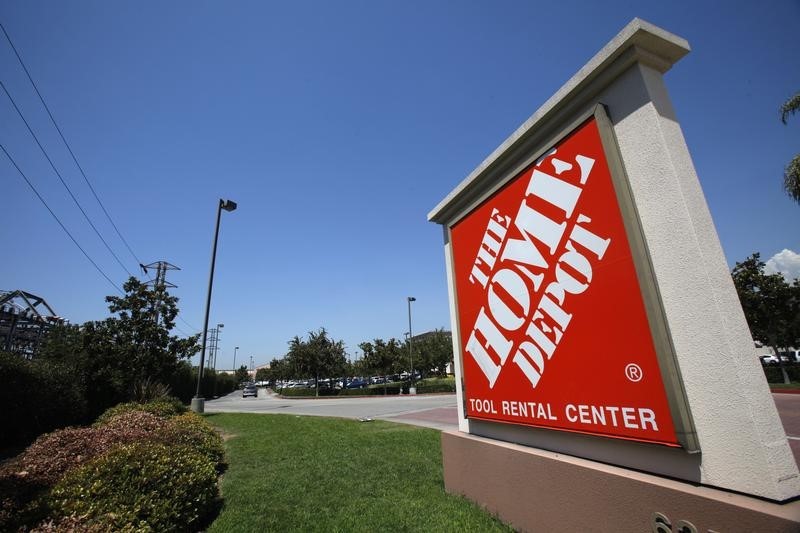DexCom earnings beat by $0.03, revenue topped estimates
On Wednesday, Bernstein SocGen Group maintained its Market Perform rating on Home Depot stock (NYSE:HD), with a steady price target of $380.00. The prominent specialty retail player, with a market capitalization of $372.5 billion, currently shows a "GOOD" overall financial health score according to InvestingPro analysis. While analyst targets range from $297 to $484, the stock appears overvalued based on InvestingPro’s proprietary Fair Value model. Ahead of the upcoming earnings reports for the home improvement sector, expectations are set for a subdued first quarter for both Home Depot and Lowe’s Companies, Inc. (NYSE:LOW), with same-store sales (comps) forecasted to decline by 0.5% for Home Depot and 2% for Lowe’s. This outlook is attributed to a combination of unfavorable weather conditions, dampened consumer sentiment, and inconsistent results from industry peers and suppliers. Home Depot, which generated revenue of $159.5 billion in the last twelve months with a healthy gross margin of 33.4%, is scheduled to report earnings on May 20. For deeper insights into HD’s financial metrics and growth potential, consider exploring the comprehensive Pro Research Report available on InvestingPro.
The analysis suggests that while tariff risks have somewhat diminished, the demand for home improvement is likely to remain subdued. This is partly due to high mortgage rates, hovering near 7%, and limited consumer spending power. Bernstein does not anticipate a significant uptick in comparable sales growth for Home Depot and Lowe’s until fiscal year 2027, where they expect to see an increase to the range of 3.0%-3.5%.
The firm expresses a preference for Lowe’s over Home Depot in the short to medium term due to lower execution risks associated with Lowe’s strategy. Lowe’s focus on capturing "low-hanging fruit" to boost professional sales and achieve cost savings is highlighted as a less risky approach compared to Home Depot’s more complex strategy targeting professional customers, which carries the potential for margin erosion.
Furthermore, the analysis projects that Lowe’s may experience a sharper recovery in the event of a market upturn, given its higher exposure to the do-it-yourself (DIY) sector and discretionary categories. In contrast, Home Depot’s professional customer strategy is not assured success and poses certain risks.
Lastly, the report indicates that the near-term performance of both Home Depot and Lowe’s is likely to be influenced more by overarching housing market trends and market expectations regarding inflation and interest rates rather than by their fundamental business operations. Despite market uncertainties, Home Depot maintains a strong dividend profile, having raised its dividend for 15 consecutive years with a current yield of 2.46%. The company’s robust financial position is reflected in its moderate debt levels and strong return on assets of 17.15%. InvestingPro subscribers have access to additional insights, including 5 more ProTips and extensive financial metrics that can help inform investment decisions.
In other recent news, Home Depot has been the subject of various developments that are catching the attention of investors. UBS analysts have reaffirmed their Buy rating on Home Depot stock, maintaining a price target of $475. This optimism follows a meeting with Home Depot executives, where the company’s strategic focus and resilience amidst market challenges were highlighted. Meanwhile, Telsey Advisory Group also maintained an Outperform rating with a $455 price target, anticipating a rebound in comparable store sales growth due to easier comparisons with previous years. However, they noted that macroeconomic pressures and tariff policies could pose challenges in the near term.
President Donald Trump is scheduled to discuss the impact of tariffs with major retailers, including Home Depot, amid concerns about potential price increases and operational slowdowns. Truist Securities has highlighted mixed outcomes for home improvement retailers like Home Depot, suggesting that lower interest rates might provide some relief, although recessionary conditions could have adverse effects. In corporate governance, Home Depot has nominated Asha Sharma, a Microsoft (NASDAQ:MSFT) Vice President, for its Board of Directors, aiming to bolster the company’s technological expertise. This nomination aligns with Home Depot’s strategy to enhance its board’s capabilities, particularly in integrating generative AI tools.
This article was generated with the support of AI and reviewed by an editor. For more information see our T&C.
